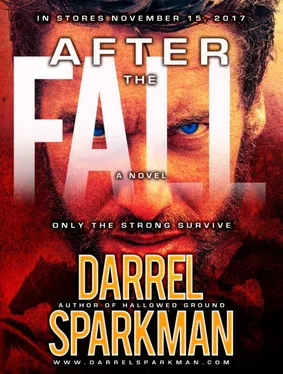John had been on the fringes of this for years. He had joined the Army at the age of seventeen. Like so many people, all he wanted was the guarantee of a place to sleep, and food to eat. He’d gotten his wish. But the price he paid was involvement in more border wars and peacekeeping missions than he cared to think about.
The remarkable event known as The Fall had started years before like a slow-growing cancer, and then spread like wildfire through the country. No one knew what started the plague, or cared. He didn’t want to know who to hate. It didn’t matter anymore. Back East they were slowly rebuilding. West of the Mississippi River however, the land was lawless and brutal. Death could come at any moment—and often did.
He was a man who’d been around, and at thirty-six was already older than the new adjusted life span of the American male. Riding dispatch for the Provisional Government, mainly between Army posts, he could do what he did best. Couriers were about the only means of communication left for the Army, and it took a skilled woodsman to navigate the forests, which were infested with people just waiting to kill a lone traveler for whatever he was carrying, especially weapons.
Rule one: Remain unseen and cover a lot of ground.
Rule two: Never forget rule one.
He realized he had a natural ability, born in the gene pool of ancestors he never knew. As a child, he lived close to the woods, and would always retreat to the cool confines of the forest whenever he needed to get away.
Now, on the new frontier of his own country, he rarely ventured into the settlements, and left the army camps he had to visit as quickly as possible. But trouble was always near. No one could avoid it entirely. Lately, he didn’t try as much to avoid trouble. It seemed like, at some inner level, he was beginning to welcome it. Some perverse part of him knew just how good he was, and just how much better than most others at the business of survival. He had eye-hand coordination that dazzled ordinary men.
Worst of all, he could feel himself becoming more callous to death and suffering every day.
At least that’s how it had been, until two weeks ago. Two weeks ago he’d been in Pine Bluff. Two weeks ago he’d killed a man. As he scanned the forest around him, Trent’s mind pushed and pulled at the memory that just wouldn’t go away.
Years ago, one of his instructors had talked to Trent about killing. A soldier expects to have to kill. It’s their business. They should not expect anything else. Yet, even the most callous of soldiers will one day find himself thinking too much about death, and his part in administering it.
What the instructor had given was a strong warning.
“It’s not the quantity… it’s the quality. Some people just need killing. You cannot reason with them and you sure as Hell cannot change them. They are rotten to the core, so you go after them for God and country or any other reason that floats your boat. When they are dead, you toss them aside with the rest of the garbage, because that is what they are. Problem is, if you are good at what you do it starts getting easy. The killing becomes automatic, and you find yourself taking less and less time to decide. Then, one day you will kill someone of whom you aren’t sure. You start doubting, and hesitating. All the black and white in your world turns to grey. You start second-guessing yourself, and when that happens, it’s time to get out. Otherwise, you die. Probably killed by the same people you were trying to protect.”
That particular day two weeks ago started innocently enough. He rode into a little jerkwater town, having about four buildings with three of them falling down, two jumps ahead of a bunch of riders. He didn’t know if they were true raider, or just a bunch of ‘good ole boys’ out to hooraw the stranger out of their neck of the woods. Both scenarios were entirely possible. About twenty of them had come bursting out of a draw next to the road where he was riding, half of them on foot, the rest on horses, screaming and yelling.
He was already hot and tired, and more than just a little cranky, so instead of running he pulled his old rifle out and laid a few rounds into the asphalt in front of them. The bullets shattered on the pavement, and the ricochets took out the knees of some of the horses. The resulting bedlam and confusion allowed Trent to get ahead of them, and into town.
Coming into the town, it reminded him of a picture postcard he saw once. The caption was, “How do you know you’re in the Ozarks? When someone’s front porch falls in—it kills more than twenty dogs.” This town seemed to have more dogs than people. It’s always good to know where you are.
Dismounting in front of what he guessed would pass for a saloon, he entered and pushed his way up to the bar.
“Got anything cool?”
Cool seemed to be a matter of interpretation. Cool was the stare he got from the man behind the planks of wood they were using for a counter.
“All right, whatever.” Trent shrugged, conceding the point. “Do you have anything to drink?”
Anything turned out to be a glass of bust-head moonshine, which threatened to rip the hair right off his head. He held the glass gingerly up to the dust-filtered sunlight coming in through the door, then gently set it down on the counter, as if he were afraid it would explode. “Man, that corn is a little green.”
The natural reserve of the hill people broke a little and the barman grinned and said plaintively, “Been aged to perfection. Almost a week.”
Trent, his eyes still watering from the drink, heard a chair scrape back on the floor. He turned to see a man standing in the corner of the room, legs spread, his right hand near his weapon. The table he had backed away from held three more men, still holding cards and looking like they wished they had business somewhere else.
“C’mon Lenny, leave the man alone,” one of the men said. “I got a good hand goin’ here.”
Lenny’s face was in shadow, but Trent could plainly see his sidearm. It was an autoloader, maybe a Browning or Colt, slung low in a plastic holster like the old SWAT teams used to wear. Fast draw artist? Gunman? Nutcase?
Who the hell knew?
All this flashed through his mind in the few seconds it took the wannabe bad man to think of something appropriate to say.
“You.” Lenny’s voice was strangely loud in the small room. “Yeah, you in the buckskins. You one of them Army scouts we been hearing about?”
Trent looked at him for a moment, and then said neutrally, “I’m a courier for the Army. I’m also tired, thirsty, and not looking for trouble.” It was in his mind to turn back to the bar and ignore the trouble hunter. But it wasn’t to be.
The man’s hand rested on the butt of his pistol. When his hand moved, Trent shot him in the chest. The mushrooming bullet left a conical pattern of blood on the wall behind him—the half-pulled pistol fell to the floor, followed closely by the man.
The bystanders in the bar were shocked into silence. No one really liked Lenny, but he was one of their own, and he was down on the floor. Sure, he was a trouble hunter. He had killed several men who came to town hunting trouble.
The eyes of the men in the bar finally moved away from the body on the floor. All eyes were riveted on Trent, standing by the bar. One second he was standing there, the next he was holding a smoking revolver. No one saw him draw, it was that fast. Even the bartender had missed it.
He walked up to the man he’d shot. There wasn’t any doubt the man would die. He knew where he’d aimed. Looking down, he was shocked at the age of the man. Man? A boy—and he was bubbling his life out of a small hole just under his left nipple. He knew the gaping wound would be on the back. An older man kneeling by the boy looked accusingly at Trent.
Читать дальше












